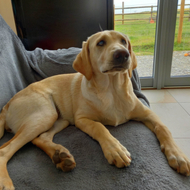
Labrador Minnie was fitted with an orthodontic bite plane.
Vets at the Royal (Dick) School of Veterinary Studies have successfully realigned a dog's canine tooth using an innovative dental procedure.
Labrador retriever Minnie is now free from pain after dentistry specialists at the school's hospital for small animals fitted her with an orthodontic bite plane.
The six-month-old was born with a painful genetic condition called lingually displaced mandibular canine teeth, which caused one of her bottom teeth to grow in the wrong direction and dig into her upper gum.
Minnie's vet referred her to the School's Hospital for Small Animals' specialist Dentistry and Oral Surgery Service, where she was evaluated by Dr Ingrid Tundo, European Diplomate in Veterinary Dentistry.
Lingually displaced mandibular canine teeth often lead to a dog's baby and/or adult teeth erupting in an incorrect position. In Minnie's case, she was born with a mild mandibular distoclusion, meaning that her lower jaw is shorter than normal.
Together, these conditions resulted in one of Minnie's lower canine adult teeth tipping forward and damaging the soft gum tissue in between her upper canine tooth and third incisor.
Keen to avoid invasive procedures or remove the troublesome tooth, Dr Tundo fitted Minnie's upper jaws with an orthodontic device called an inclined bite plane. He left the device in place for six weeks, during which the displaced tooth tipped back into a normal position.
Dr Tundo said: “We were delighted to provide such a non-invasive treatment for Minnie and that the procedure was a success. As with most patients with lingually displaced canine teeth, Minnie presented at a young age making the advantages of regaining normal function of this important permanent tooth, and avoiding its extraction, even more beneficial.”
Claire Harrison, a veterinary technician specialist in dentistry, added: “Our specialist Dentistry Service worked with the referring veterinary surgeons and suitable treatment options were discussed with Minnie’s owners to provide the best solution for their pet. Minnie was a fantastic patient, and we are happy to have been able to help her.”
Image (C) University of Edinburgh.



 The WSAVA has invited veterinary professionals to a webinar on responsible antibiotic usage in dentistry.
The WSAVA has invited veterinary professionals to a webinar on responsible antibiotic usage in dentistry.